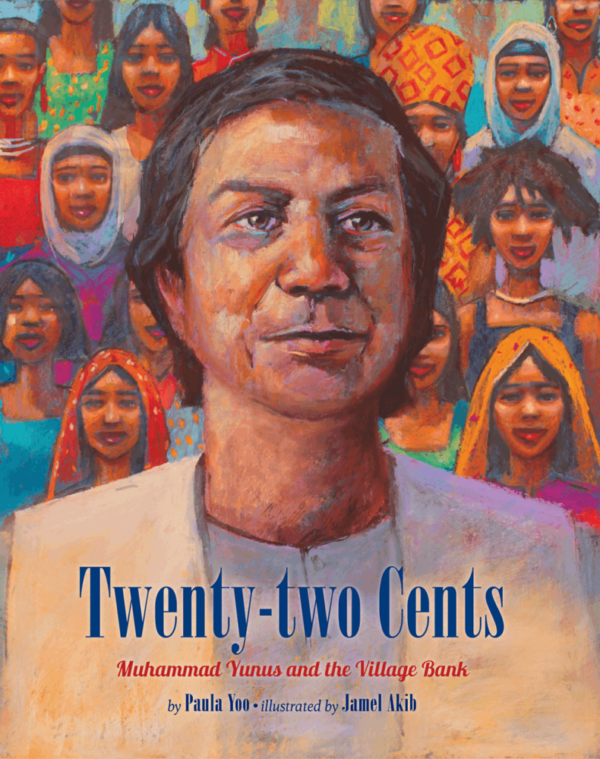Growing up in Bangladesh, Muhammad Yunus witnessed extreme poverty all around and was determined to eradicate it.
In 1976, as an Economics professor, Muhammad met a young craftswoman in the village of Jobra who needed to borrow five taka (twenty-two cents) to buy materials. No bank would lend such a small amount to an uneducated woman, so she was forced to borrow from corrupt lenders who charged an unfair interest rate, and left her without enough profit to buy food. Muhammad realized that what stood in the way of her financial security was just a few cents. Inspired, Muhammad founded Grameen Bank where people could borrow small amounts of money to start a job, and then pay back the bank without exorbitant interest charges.
Over the next few years, Muhammad’s compassion and determination changed the lives of millions of people by loaning the equivalent of more than ten billion US dollars in micro-credit. This has also served to advocate and empower the poor, especially women, who often have limited options. Twenty-two Cents is an inspiring story of economic innovation and a celebration of how one person, like one small loan, can make a positive difference in the lives of many.
This book is also available in chapter book form as part of Lee & Low Books’ new series, “THE STORY OF…” You can order it here: https://www.leeandlow.com/books/the-story-of-banker-of-the-people-muhammad-yunus
AWARDS
2014 Junior Library Guild Selection
2014 CCBC Choices Annual Best Children’s Books of the Year – Cooperative Children’s Book Center
2015 Best Children’s Books of the Year – Bank Street College of Education
2015 Notable Books for a Global Society – Children’s Literature & Reading Special Interest Group of the International Reading Association
2015 Best Multicultural Books – Center for the Study of Multicultural Children’s Books
2015 Skipping Stones Honor Award – Skipping Stones: An International Multicultural Magazine
2015 South Asia Book Award – South Asia National Outreach Consortium
2015 2015 Social Justice Literature Award – International Literacy Association



BOOKLIST –
This eye-opening picture book provides an affecting look at how simple ideas can change the world.
BOOK HORN –
This inspiring biography of Bengali “Banker to the Poor” Muhammad Yunus begins with precepts he learned in his childhood. Yunus’s path to becoming an economist known for small, low-interest loans to the impoverished (micro-credit) and to receiving the Nobel Peace Prize is backdropped by striking chalk-pastel illustrations in vibrant colors.
KIRKUS –
Microbanks aren’t new, although they are gaining prominence. Here is the story of the first—or at least the formal first—and the one that gained the most notoriety. Muhammad Yunus grows up in the far-eastern part of India before Partition, in what is now Bangladesh. Paula Yoo tells the story clearly and unflinchingly, though compassionately, explaining to readers the dreadful trap of the debt cycle. That is lesson No. 1 in this book: The debt cycle is a global plague. Yunus realizes that a simple monetary gift will not help the women out of poverty, but a tiny loan that brings her and other village women into entrepreneurship can. This is lesson No. 2 and what earns Yunus the Noble Peace Prize. Akib’s artwork is drawn in hot shades of pastel that are at once unforgiving and exhilarating. A heart-gladdening testament to pulling your own suspenders tight, with a little help from your friends.
PUBLISHERS WEEKLY –
In detailed and inviting prose, Yoo shares the story of activist and Nobel Peace Prize winner Yunus. . . Akib’s grainy, jewel-toned chalk pastels contrast a sense of scarcity and deprivation with one of warmth and humanity. Yoo makes the significance of Yunus’s contributions understandable, relevant, and immediate.
SCHOOL LIBRARY JOURNAL –
This poignant picture book biography describes 2006 Nobel Peace Prize winner Muhammad Yunus, the man who developed microcredit, or the economic movement that gives small loans to the impoverished and that is breaking the cycle of rural poverty around the world. Yoo’s text is straightforward and detailed, and her story of a true hero of the modern world will resonate with students, while the accompanying illustrations enhance the narrative through line and color in soft chalk pastels. Back matter includes a bibliography of sources, an afterword with information about poverty in America, and an update on Yunus’s life since his retirement in 2011. This hopeful and inspiring tale sheds light on an important but little-known subject who made a huge difference.